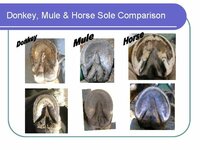I don't have personal experience with donkeys but I have read about them. They usually are much more easy to keep in weight than horses, so they don't need as much feed and might not even need grain at all, it is quite dangerous for them to get over weight because they can get a metabolic illness called hyperlipaemia were the fat reserves suddenly go to the blood stream this can cause them lots of problems, of them laminitis and other serious issues. They do need more shelter than horses from rain, they do not produce nearly as much coat waxes as horses so their fur gets wet easily. They also are much more stoic than horses, they don't display pain and illness as easily, when they look sick its usually because its very bad and might be too late so its extremely important that you learn the usual behavior patterns of your donkey so any slight anomaly is promptly investigated, they are less prone to colic than horses but it tends to be more serious because as I already said they are good at hiding pain so by the time you realize something is wrong might be too advanced. About their hooves they are different from a horses (see pic) therefore the need of a farrier with experience with donkeys. They are quite social even if they do not really form herds they do need companionship, the best is another donkey but other animals can work, however if the donkey its a stallion it can become too aggressive against other males if there is a mare close be it donkey or horse, they also are more territorial than horses, so it can be dangerous for dogs and other smaller species that get into their paddock or territory, a fact exploited by some livestock owners were they put donkeys to guard their livestock from predators.
View attachment 408829
About sexual aspects; Their genitalia is very similar to horses, main differences Ive seen is Donkeys tend to have larger genitals in proportion to size, many times they have vestigial nipples at the sides of their sheath, their penis usually is longer and fully pigmented although there are plenty of examples of pink colored genitalia, their medial ring is less pronounced than in horses and their flare seems to be larger, their testicles are usually significantly larger than a similar sized horse and they have a very pronounced epididymis tail. About sexual behavior; Donkeys being members of the equid family should share many things with horses however from what I've read they tend to be quite aggressive when breeding so you need to be careful, know them well and work a lot with them so they understand you aren't to be breed like a donkey mare, also that you know their individual cues and behaviors, they take some time to reach erection at first and try to feverishly mount with no erection and bite, specially during coitus, here is were they can hurt you.
This is basically all the advice I can give, I will say it again; I have no personal experience with donkeys just what Ive read and heard, you have to be careful when doing anything sex related with a horse and even more so with a donkey but I think its possible to have a nice partner to have fun with you after a long time of knowing each other and working together for a common goal, that does not discard the possibility of some mishaps along the way but I think its what you sing up to when you are into equines, just like horse riding, means you accept the risk, tough riding seems to be significantly more dangerous than sexual activity with horses and donkeys (unless you engage into receptive anal sex or wanna have fun with a zebra).


